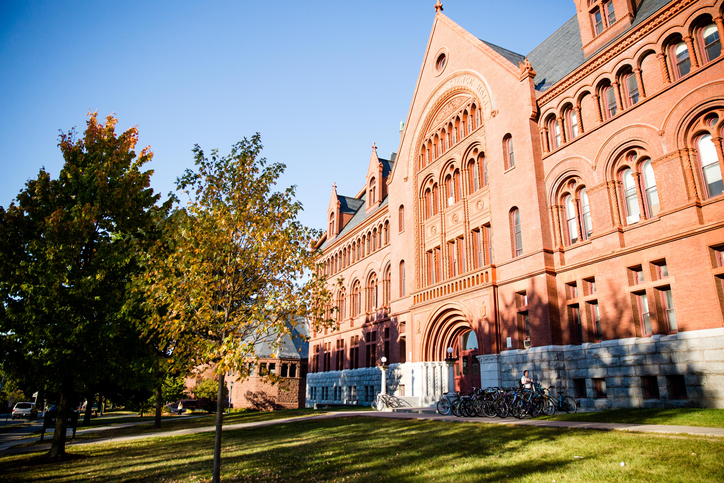

Colleges these days really go out of their way to provide more resources and opportunities for people interested in earning a degree. You’ll find them offering flexible scheduling options, generous credit transfer policies that often include credit for job and military experience, along with scholarships to help make the whole journey more financially manageable. In many ways, college has never been more accessible to more people than it is right now.
It’s a good thing, since the professional fields with all the well-paying jobs people want aren’t getting any easier to get into. In fact, more than ever, professional positions that were once a sure thing for anybody with a four-year degree are more often requiring candidates to come in with strong backgrounds and a portfolio of academic and experiential accomplishments just to get their foot in the door.
These compounding factors are putting a premium on the college professors qualified to manage bigger classes as student enrollments rise and impart the knowledge and skills those students need to be successful after graduation. It’s no surprise then that the US Bureau of Labor Statistics puts the projected job growth rate at for college professors at 12% during the ten-year period leading up to 2030.
If you’ve ever considered teaching at a college or university, now is the time. And here’s why. As a professor, you have the freedom to explore topics and ideas that interest you, work a flexible schedule, and make a decent salary that will give you access to a comfortable middle-class lifestyle. If that weren’t enough, you also get to contribute your skills to engaging young and ambitious minds and do your part in shaping the future of our world for the better.
But what does it take to be a college professor? What qualifications are needed and are those qualifications the same for every college? The answers are not as complicated as you might think.
Becoming a College Professor: Meeting Job Qualifications and Achieving Tenure
The qualifications it takes to become a college professor can vary slightly from school to school, but will always involve an advanced degree and some previous teaching experience:
 If you can put a check mark by these two boxes, you’ll meet the basic qualifications and could be invited to interview at a college or university faculty position. But, of course, nobody learns how to become a college professor by simply checking requirements off a list.
If you can put a check mark by these two boxes, you’ll meet the basic qualifications and could be invited to interview at a college or university faculty position. But, of course, nobody learns how to become a college professor by simply checking requirements off a list.
The multi-phased interview process will not only involve making a real connection with the hiring committee that shows you have the attitude and love it takes to be a contributing member of the faculty and university family, but you will also perform a teaching demonstration that shows you have the confidence and skills to present complex topics in a way that resonates with students and sticks in their heads. That means the requirements to become a professor also involve a number of important qualities that aren’t as easy to show on paper or through a high-energy interview. These are the qualities that your review committee will be looking for during the years you work toward achieving tenure status:
Passion: A passion for learning, for teaching, and for mentoring the future minds of the university is key to any college professorship. They are the face of the university, and a professor who does not have a passion for learning and building relationships will find it difficult to secure a long-term career as a professor.
Written Communication Skills: To be a college professor you must have strong and consistent control of the written language. College professors write extensively for their courses, back and forth with their colleagues and students, and throughout their research. Being able to communicate effectively and efficiently is an essential skill for any aspiring professor.
Research Skills: Professors are expected to continually contribute to their field through research and publications, promoting their school, their department, as well as themselves. Jump at any opportunity that comes your way during your graduate program to assist and contribute to research, and, of course, during your first years at the college as you work toward tenure.
Publication and Presentation: Peer-reviewed published articles or books and other relevant experiences as an academic is expected of college professors. This can include presenting at collegiate or subject-relevant conferences while you work toward tenure.
Mentoring Experience: Mentoring and guiding teaching assistants is an essential role of a college professor even during those first years, and naturally you’ll be mentored by other tenured professors yourself. It’s all part of the long legacy of mutual support that universities encourage to make faculty departments strong and unified. Strong recommendations from those who have mentored you and plenty of hours devoted to mentoring others is a standard expectation of any college professor.
How Long Does It Take to Become a College Professor?
Once hired on to work as an instructor at a college or university, you can expect it to take between 3 and 5 years to achieve tenure, which essentially locks you into that position and makes you a lifelong member of the school community. This is the natural career progression for most professors. But if you count the time you spend in school preparing to teach so you can qualify for tenure, there’s a little bit more to answering that question.
While you can certainly teach as an adjunct professor at the college level with a master’s degree, when most people dream of becoming a professor, it usually means getting in line for a full-time tenure position at a university. At community colleges, a master’s would suffice for tenure, so it’s possible to get to that point in about 6 years from the time you begin your bachelor’s program. But to be eligible for tenure at a university, you can expect to invest eight years in college while completing a doctorate program. Gaining teaching experience can add time to the process.
How A Liberal Arts Degree Can Help You Become a Professor
A liberal arts degree is dedicated to providing you with a holistic education that is centered around the key components of being human, namely creativity, collaboration, communication, critical thinking and service. These skills, along with a dynamic and innovative education, create an experience and skillset that directly applies to the qualifications needed to become a professor.
College Professor Job Description
 College professors are responsible for preparing their students for life-long learning well beyond what they learn during their college years. Using course materials, university established curriculum, and personal expertise, college professors are tasked with teaching students the materials necessary to meet graduation requirements.
College professors are responsible for preparing their students for life-long learning well beyond what they learn during their college years. Using course materials, university established curriculum, and personal expertise, college professors are tasked with teaching students the materials necessary to meet graduation requirements.
Although teaching and classroom instruction methods definitely differ dramatically from professor to professor, they all make use of common formats that include lectures, seminars, field study and lab work. Even in liberal studies programs where students engage in independent studies, college professors are always there to offer support and serve as mentors.
Professors are also expected to contribute to the field of knowledge to which they have been hired. Therefore, professors are often required to continually be involved in research and publications as well as devote their time to academic services, such as serve as advisors and on committees, mentor and train teaching assistants, write proposals for grants, develop course material, and attend conferences. College professors are representatives of the schools where they teach and are therefore expected to be leaders and contributors within their professional fields, publishing books, journals, and presenting at conferences.
The Job Description Can Differ Based on the Type of Professorship
Of course, professors are the academic leaders of their school. Through their continued research and growing experience, they provide insight and expertise to the college as well as to their students.
But there are a variety of avenues and opportunities for you to teach at the collegiate level, long before becoming the lead professor. These opportunities can be a clearer, more direct path to the role of college professor as they provide you an opportunity to gain experience and work directly with a university. Each position carries its own unique expectations…
Assistant Professor: Assistant professors are expected to support students even outside of class and assist the senior professor in any number of ways, from developing curriculum content to scoring exams. As a step below associate professors, assistants are not, however, expected to lead lectures on their own on a daily basis.
Associate Professor: An associate professor aids the professor in research and teaching. They attend conferences, supervise students, and even take the lead in teaching class on occasion. They are professors in training, gaining all the experiences of a lead professor to build a portfolio of teaching skills.
Head of Department (HOD): The HOD is responsible for their particular department. They are leaders of the department who provide vision, maintain accountability, and support their faculty. They are considered lead professors amongst their peers.
Research Professors: Research professors are expected to spend a great deal of time conducting research, writing papers, and documenting their findings. Although still professors, their time and energy are spent furthering their discipline through original research and fieldwork rather than in the classroom.
The Job Description for College Professors Also Differs Based on the Type of College and Setting
Most would-be college professors envision themselves at Harvard or Duke or other such premier universities. There are, however, a variety of other opportunities to be a professor, some of which offer larger doors of opportunity that can either provide a more balanced life or act as a steppingstone to your loftier dreams of teaching at an elite college or university:
Community College Professor
To become a community college professor, you must still hold a master’s degree or doctorate in your field, as well as up to five years of teaching experience. Because community colleges aren’t often the recipients of research grants, professors at two-year schools are expected to focus on teaching, rather than research and grant writing.
Online College Professor
Online college professor jobs are no different than traditional ones. The qualifications are the same. The expectations and duties are relatively similar, and involve designing curriculum, providing support to students and holding class – they just do it all through a digital medium. Online courses can be delivered as prerecorded instruction or live recordings, via Zoom or a number of other online interactive formats.
International College Professor
Although most international colleges maintain the same expectations and standards upheld at American colleges, there are a few notable exceptions – the ability to travel and the kind of global worldview and flexibility it takes to adapt to different languages and cultures.
Adjunct vs Faculty Professors: What’s the Difference
Adjunct and tenured faculty professors both hold graduate degrees and are leaders within their field. The biggest difference between the two is that adjunct professors are considered temporary employees and therefore teach on a contract basis. Tenured faculty professors are salaried employees who work and teach fulltime, earning a larger salary and benefits.
For a variety of reasons, cost effectiveness being one of them, colleges have turned to hiring adjunct professors rather than making a career-long commitment to retaining tenured professors. This decision, although beneficial in a variety of ways, can often have a negative impact on students and the overall school culture since stability and relationships are difficult to maintain with a revolving door of instructors, some of which do not have an office or regular office hours.
Pursing an adjunct professorship, however, can get your foot in the door to a particular college or build your resume of experience. It can also act as a secondary form of income for those in an already established profession such as teaching or business.
College Professor Salary and Job Outlook
 According to 2020 Bureau of Labor Statistics data, the median pay for a college professor was $80,560 per year. The lowest 10% earned just over $40,000 while the top 10% earned more than $179,000. The determining factor was not the state, necessarily, but the subject.
According to 2020 Bureau of Labor Statistics data, the median pay for a college professor was $80,560 per year. The lowest 10% earned just over $40,000 while the top 10% earned more than $179,000. The determining factor was not the state, necessarily, but the subject.
Median annual salaries for college teachers in different disciplines looked like this in May 2020:
- Law Teachers: $116,430
- Architecture Teachers: $90,880
- Political Science Teachers: $85,000
- Chemistry Teachers: $80,400
- History Teachers: $76,890
- Foreign Language Teachers: $69,920
- Education Teachers: $65,440
In addition to subjects taught, the type of college also contributed to differences in professor pay.
Median annual salaries for postsecondary teachers according to the types of schools they teach in:
- College and universities; private: $83,460
- College and universities; state: $81,110
- Junior colleges; local: $80,020
- Junior colleges; state: $62,680
What is most encouraging, however, is that from 2020 – 2030, post-secondary teachers can expect to see a 12% job growth rate, which is considerably faster than the national average for all occupations.
Becoming a professor is a noble and prestigious career as it comes with a great deal of responsibility, opportunity, and pride. As a college professor, you have a direct influence on the lives of the students you teach, as well as the direction of your university and the very field you teach. As a college professor, you help shape the future, and with a liberal arts degree as part of your preparation, you’ll have a more diverse foundation of understanding and knowledge to pass on.
2020 US Bureau of Labor Statistics job market trends and salary figures for Postsecondary Teachers are based on national data, not school-specific information. Conditions in your area may vary. Data accessed December 2021.






